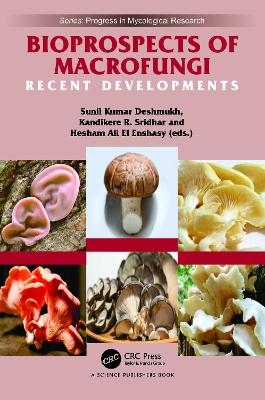
Bioprospects of Macrofungi
CRC Press (Verlag)
978-1-032-38167-1 (ISBN)
The discipline of mycology is a fascinating one. It has a major influence on the nutrition, health and environmental safety of mankind. Cultivation of edible and non-edible mushrooms for nutrition, pharmaceuticals, biopolymers and biocomposites will open up new avenues in research as well as the more profitable utilization of agricultural residues. Cultivation and of domesticated and wild mushrooms poses a challenge to fulfill the needs of human/animal nutrition and utilization of agrowastes tangibly. Cultivation of ectomycorrhizal fungi benefits nutrition as well as plant protection. Macrofungi are the major source of several metabolites of nutritional, health, agricultural and industrial significance (e.g., antioxidants, antimicrobials and pigments). Macrofungal bio composites provide alternatives to the use of animal-derived or plant-derived products (e.g., nanopapers, leather and packaging materials). They serve a dual role in providing nutrition and pharmaceuticals (nutraceuticals) to humans as well as livestock. Macrofungi interact with insects symbiotically (e.g., Termitomyces with termites) and provide delicious nutraceutical product. They also control insects by infecting and producing pharmaceutically and metabolite-rich products (e.g., Cordyceps attacks insects). Macrofungi have a strong potential to control pathogens like nematodes in soil (bioremediation). They are also useful as biofertilizers to meet the needs of plant nutrition.
The book outlines current advances in macrofungal technology. It highlights different facets of macrofungal cultivation, bioactive compounds, biocomposites, nutraceuticals, benefits with interaction with insects, application as biofertilizers and ecosystem services like bioremediation.
Sunil Kumar Deshmukh is Scientific Advisor to Greenvention Biotech, Uruli-Kanchan, Pune, India and Agpharm Bioinnovations LLP, Patiala, Punjab, India. A veteran industrial mycologist, he has spent a substantial part of his career in drug discovery at Hoechst Marion Roussel Limited [now Sanofi India Ltd.], Mumbai, and Piramal Enterprises Limited, Mumbai. He has also served TERI-Deaken Nano Biotechnology Centre, TERI, New Delhi, and as an Adjunct Associate Professor at Deakin University, Australia. He has to his credit 8 patents, 145 publications, and 18 books on various aspects of fungi and natural products of microbial origin. He is a president of the Association of Fungal Biologists (AFB) and a past president of the Mycological Society of India (MSI). Dr. Deshmukh is an Associate Editor of the Frontiers in Microbiology series and editor of Progress in Mycological Research published by CRC press. Dr. Deshmukh serves as a referee for more than 20 national and international journals. He has approximately four decades of research experience in getting bioactives from fungi and keratinophilic fungi. Kandikere R. Sridhar is an adjunct faculty member at Mangalore University, India. His primary area of study is aquatic fungi in fresh and marine waters. He has research collaborations in the USA, Canada, Germany, Switzerland and Portugal. He was president of the Mycological Society of India (2018), a distinguished Asian Mycologist (2015) and one of the world's top 2% scientists in the field of mycology (2019–21). He has published over 500 research articles and edited 10 books. He is on the editorial board of several national and international journals and reviewed over 150 research papers. Hesham Ali El Enshasy (Dr. rer. Nat.; M.Sc., M.Sc.) is the current Director of the Institute of Bioproduct Development (IBD), and professor in bioprocess engineering, Faculty of Chemical and Energy Engineering, Universiti Teknologi Malaysia (UTM). Since 2020, he is recognized as one of the top 2% of researchers in the world in the field of Biotechnology, according to Stanford University research study for both career and single-year lists. Prof. El Enshasy received his B.Sc. and M.Sc. in Microbiology (Ain Shams University, Egypt), Dr. rer. Nat. in Industrial Biotechnology (TU Braunschweig, Germany 1998), M.Sc. Technology Management (UTM, Malaysia). He has more than 350 publications in the form of peer-reviewed international journals, book chapters, and books. He has been invited as a keynote, plenary, and guest speaker at more than 100 international conferences in the field of industrial biotechnology and BioEconomy. He serves as editor, associate editor, and editorial board member for several reputed journals.
Preface. CULTIVATION. Advances in Cultivation of Ectomycorrhizal Mushrooms in Japan. Cultivation of Mushrooms in Submerged Culture for Production of Bioactive Compounds Production. Spent Mushroom Substrate: Perspectives and Applications. BIOACTIVE COMPOUNDS. Bioactive Compounds and Medicinal Value of the Rare Mushroom Agaricus blazei. Antimicrobial and Antioxidant Properties of Cultivated Macrofungi: Extraction and Characterization. Bioactive Compounds from Macrofungi and their Potential Applications. On the Secondary Metabolites and Biological Activities of Bird’s Nest Fungi. Irpex lacteus - A Less Explored Source of Bioactive Metabolites. Laetiporus sulphureus: A Rich Source of Diverse Bioactive Metabolites. BIOCOMPOSITES. Experimental Analysis of the Mechanics of Mycelium-Based Biocomposites. Fungi-Derived Composite Nanopapers. NUTRACEUTICALS. Nutraceutical Profile of Four Wild Edible Mushrooms of the Western Ghats. Medicinal Mushrooms as Nutritional Management for Post COVID-19 syndromes. Health Benefits of Mushrooms on Obesity and Chronic Diseases. Functional Role of Macrofungi as Prebiotics and Health Perspectives. INTERACTION WITH FAUNA. Cordyceps Militaris and its Applications. BIOFERTILIZERS AND BIOCONTROL. Ectomycorrhizal Fungi as Biofertilizers. Edible Mushroom Bioproducts for Controlling Parasitic Nematodes. Mushroom Products in Malaysia.
| Erscheinungsdatum | 17.10.2023 |
|---|---|
| Reihe/Serie | Progress in Mycological Research |
| Zusatzinfo | 30 Tables, black and white; 48 Line drawings, black and white; 13 Halftones, color; 13 Halftones, black and white; 13 Illustrations, color; 61 Illustrations, black and white |
| Verlagsort | London |
| Sprache | englisch |
| Maße | 156 x 234 mm |
| Gewicht | 960 g |
| Themenwelt | Naturwissenschaften ► Biologie ► Botanik |
| Naturwissenschaften ► Biologie ► Genetik / Molekularbiologie | |
| Naturwissenschaften ► Biologie ► Mykologie | |
| Weitere Fachgebiete ► Land- / Forstwirtschaft / Fischerei | |
| ISBN-10 | 1-032-38167-1 / 1032381671 |
| ISBN-13 | 978-1-032-38167-1 / 9781032381671 |
| Zustand | Neuware |
| Informationen gemäß Produktsicherheitsverordnung (GPSR) | |
| Haben Sie eine Frage zum Produkt? |
aus dem Bereich


